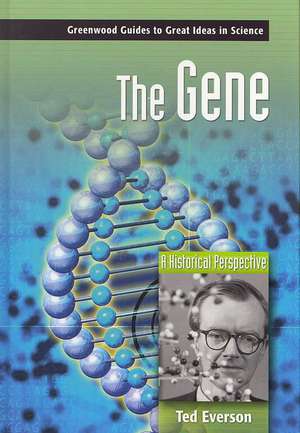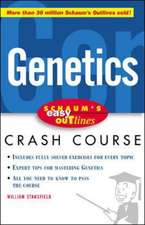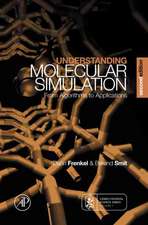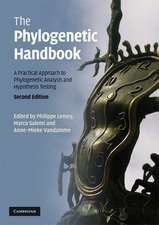The Gene: A Historical Perspective: Greenwood Guides to Great Ideas in Science
Autor Ted Eversonen Limba Engleză Hardback – 29 mai 2007 – vârsta până la 17 ani
Preț: 276.48 lei
Preț vechi: 477.81 lei
-42% Nou
Puncte Express: 415
Preț estimativ în valută:
52.91€ • 57.45$ • 44.44£
52.91€ • 57.45$ • 44.44£
Carte tipărită la comandă
Livrare economică 23 aprilie-07 mai
Preluare comenzi: 021 569.72.76
Specificații
ISBN-13: 9780313334498
ISBN-10: 0313334498
Pagini: 208
Dimensiuni: 178 x 254 x 20 mm
Greutate: 0.59 kg
Editura: Bloomsbury Publishing
Colecția Greenwood
Seria Greenwood Guides to Great Ideas in Science
Locul publicării:New York, United States
ISBN-10: 0313334498
Pagini: 208
Dimensiuni: 178 x 254 x 20 mm
Greutate: 0.59 kg
Editura: Bloomsbury Publishing
Colecția Greenwood
Seria Greenwood Guides to Great Ideas in Science
Locul publicării:New York, United States
Notă biografică
Ted Everson is the Program Manager for Biotechnology Studies in the Center for Contemporary History and Policy at the Chemical Heritage Foundation. He earned a PhD in History and Philosophy of Science and Technology from the University of Toronto, in which he explored historically the increasing use of genetic concepts and technologies in heathcare, an MS in Medical Genetics from the University of British Columbia, focusing on genetic and physical mapping of the human genome, and a BS in Biology from the University of British Columbia. In addition to several academic articles and presentations for various audiences, he is the author of Genetic Engineering: Methods, in Colin Hempstead and William Worthington, eds., Encyclopedia of Twentieth Century Technology and Genetics and Molecular Biology, in Brian Baigre, ed., History of the Exact Sciences and Mathematics.
Recenzii
This work focuses on making scientific concepts in genetics accessible to students ranging from high school through university, along with the interested general public. Stating that the concept of the gene has a historical lineage, Everson traces this development from the ancient Greeks and medieval period through to current research. Along the way he discusses Gregor Mendel's contribution to genetics, the development of molecular biology, DNA, the Human Genome Project, and current ethical issues surrounding genetics. This work includes a time line, glossary, and bibliography on the important literature of the history of genetics. Illustrations are easy to understand and support the text. Everson has written a highly readable and interesting survey of the history of genetics. Recommended. Lower-/upper-level undergraduates and graduate students.
Everson's book, part of a series called Greenwood Guides to Great Ideas in Science, is about the gene as a concept--an evolving idea whose changing nature has had a most profound impact not only on life science, but on our society and economy..Everson does a masterful job..I recommend The Gene: A Historical Perspective highly to all those interested in genetics or the history of science.
Everson explores the historical development of scientific ideas associated with the gene. He describes the origins of genetics from ancient Greece onward, important scientific events, and those who contributed to scientific understanding, such as Darwin, Mendel, and August Weismann. Modern genetics during the twentieth century is the primary focus, with discussion of the contributions of Thomas Hunt Morgan and Watson and Crick, molecular biology, social issues and biology, the understanding of DNA, the Human Genome Project, modern debates, and ethical issues. The series aims to make concepts accessible to high school and college students and general readers.
The origins of genetics began with the study of life and then of biology. It was only when Gregor Mendel wrote about his breeding experiments that the word genetics was coined. Tracing this development begins with Ancient and Medieval Inheritance, Renaissance and Enlightenment Views of Inheritance, Heredity in the Nineteenth Century, Gregor Mendel and the Concept of the Gene, The Gene and Unifying Biology, Molecular Biology and the Gene, The Switch to DNA, Manipulating DNA, The Human Genome Project, Genetics Today and The Gene and Ethical Issues. The final chapter on the ethical issues involving the gene will be helpful for debate teams..Appendixes include an 8-page timeline, an 11-page glossary and an 8-page bibliography. The timeline will be especially helpful to students who are trying to place their research in focus with what went before and what came after. Your biology teachers will welcome this brief introduction to the Human Genome Project.
[T]horoughly researched, with an impressive timeline of major ideas about inheritance..[i]f your passion is the history of science I think you will find this book a useful and concise conjunction of normally fragmented information. I would recommend this book for a larger audience for two other reasons. First, Eversons account of how the modern synthesis between genetics and the theory of evolution developed is the best I have ever read. And for anyone struggling with anti-evolutionary forces in their school or community, heres some powerful ammunition. Second, his account of how the Human Genome Project was justified and paid for at the expense of more cost-effective preventative public health initiatives should be a must-read for anyone in a world of steadily diminishing resources. For that alone, I would have a copy of the book for my classroom.
Everson's book, part of a series called Greenwood Guides to Great Ideas in Science, is about the gene as a concept--an evolving idea whose changing nature has had a most profound impact not only on life science, but on our society and economy..Everson does a masterful job..I recommend The Gene: A Historical Perspective highly to all those interested in genetics or the history of science.
Everson explores the historical development of scientific ideas associated with the gene. He describes the origins of genetics from ancient Greece onward, important scientific events, and those who contributed to scientific understanding, such as Darwin, Mendel, and August Weismann. Modern genetics during the twentieth century is the primary focus, with discussion of the contributions of Thomas Hunt Morgan and Watson and Crick, molecular biology, social issues and biology, the understanding of DNA, the Human Genome Project, modern debates, and ethical issues. The series aims to make concepts accessible to high school and college students and general readers.
The origins of genetics began with the study of life and then of biology. It was only when Gregor Mendel wrote about his breeding experiments that the word genetics was coined. Tracing this development begins with Ancient and Medieval Inheritance, Renaissance and Enlightenment Views of Inheritance, Heredity in the Nineteenth Century, Gregor Mendel and the Concept of the Gene, The Gene and Unifying Biology, Molecular Biology and the Gene, The Switch to DNA, Manipulating DNA, The Human Genome Project, Genetics Today and The Gene and Ethical Issues. The final chapter on the ethical issues involving the gene will be helpful for debate teams..Appendixes include an 8-page timeline, an 11-page glossary and an 8-page bibliography. The timeline will be especially helpful to students who are trying to place their research in focus with what went before and what came after. Your biology teachers will welcome this brief introduction to the Human Genome Project.
[T]horoughly researched, with an impressive timeline of major ideas about inheritance..[i]f your passion is the history of science I think you will find this book a useful and concise conjunction of normally fragmented information. I would recommend this book for a larger audience for two other reasons. First, Eversons account of how the modern synthesis between genetics and the theory of evolution developed is the best I have ever read. And for anyone struggling with anti-evolutionary forces in their school or community, heres some powerful ammunition. Second, his account of how the Human Genome Project was justified and paid for at the expense of more cost-effective preventative public health initiatives should be a must-read for anyone in a world of steadily diminishing resources. For that alone, I would have a copy of the book for my classroom.



















